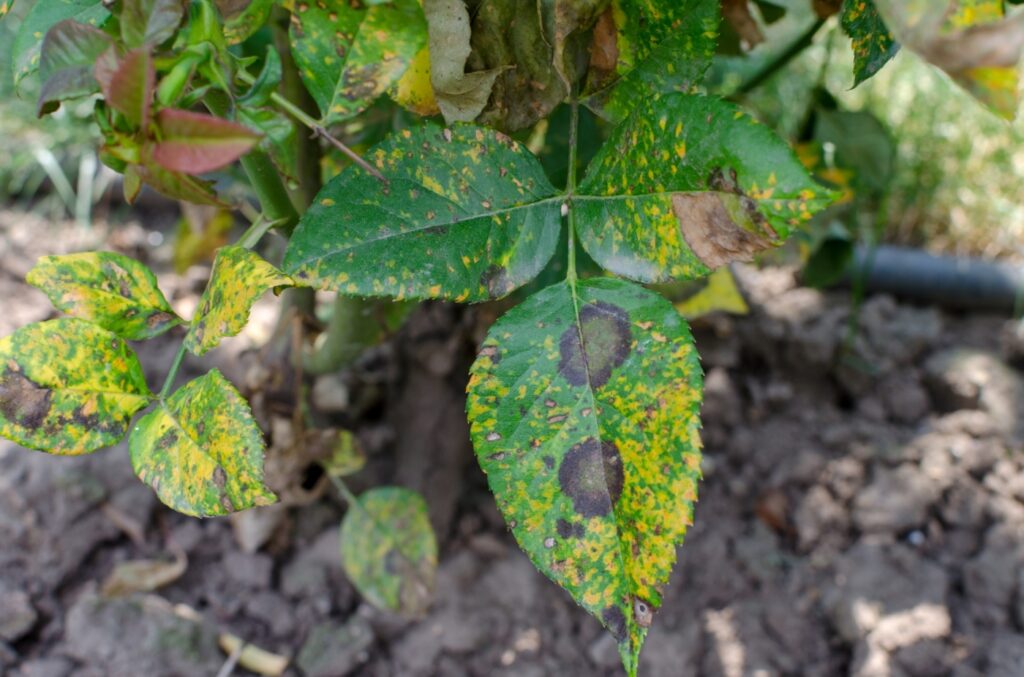
Q: Last year, my roses had a case of rust and some insect issues, so I treated them with Neem Oil. Afterward, all of my rosebushes lost all of their leaves and they didn’t come back until later in the summer. This spring they came back as beautiful as ever. In late spring, the rust reappeared, so I treated again with Neem, but I was careful to pick an especially cool week and followed the label directions carefully. A week later, they lost almost all leaves and the buds withered.
Systemic pesticide works wonderfully, but I heard that it kills bees. Can you suggest something I could use that will work and not kill off my roses? I don’t want to go another year with no roses for my bouquets!
ANSWER: Rust is caused by a fungus (Phragmidium mucronatum). In California, it is more common in coastal regions, but can also be a problem in drier areas that have experienced exceptionally wet winters. Fungal diseases are notoriously difficult to treat, so prevention is always the best strategy. Avoid overhead watering and overcrowding. Remove any affected branches and fallen leaves and dispose in the trash.
Neem oil, although labeled as a treatment for fungal diseases, is of limited usefulness since it requires repeat applications. If rust is a recurring problem, my recommendation is to look for the underlying cause and fix that. Consider planting varieties that are disease resistant. Many old-fashioned varieties are surprisingly tough, and they are fragrant as well.
I’m not sure why your roses defoliated (lost all their leaves) after the neem treatment unless it was applied undiluted. This is a common mistake (one that I have made myself).
You stated that you saw evidence of insect damage but didn’t state what kind of insect. One of the most important steps in solving gardening problems is identifying the problem correctly. Here are two helpful online resources to help you identify rose problems:
https://cagardenweb.ucanr.edu/Landscape_Trees/Roses_are_Special/
http://www.ipm.ucdavis.edu/PMG/GARDEN/PLANTS/rose.html
Systemic insecticides are indeed harmful to honeybees, but some are less harmful than others. Bees do visit roses, but only once the flowers have opened, so this is a legitimate concern.
Roses are susceptible to attack from a variety of insects, but they are also hosts to many beneficials. This means that not every problem needs immediate treatment. A limited number of aphids, though bothersome, will feed ladybugs, lacewings, and hoverflies. Sometimes you must put up with some pests in order to feed your insect friends.
Q: Last year somebody asked you about citrus leaf curl. This year I noticed that my Washington orange has it on much of the new growth. What was the name of the pesticide you recommended?
A: Citrus leafminers can cause curling in affected leaves, which can be unsightly but not harmful unless a great number of leaves are affected. If the infestation is extreme, a soil drench systemic insecticide that is labeled safe for fruit trees (Imidacloprid) can be used. (As a master gardener, I can’t recommend specific brands.) In order to protect the bees, this should be applied after the tree has flowered.
Looking for more gardening tips? Here’s how to contact the Master Gardener program in your area.
Los Angeles County
mglosangeleshelpline@ucdavis.edu; 626-586-1988; http://celosangeles.ucanr.edu/UC_Master_Gardener_Program/
Orange County
ucceocmghotline@ucanr.edu; 949-809-9760; http://mgorange.ucanr.edu/
Riverside County
anrmgriverside@ucanr.edu; 951-683-6491 ext. 231; https://ucanr.edu/sites/RiversideMG/
San Bernardino County
mgsanbern@ucanr.edu; 909-387-2182; http://mgsb.ucanr.edu/
